
How to clean dental implants
Learn everything our leading clinicians recommend for cleaning the 3 most common types of dental implants: single tooth implants, implant dentures and fixed full arch mouth implants (or full mouth implants).
Ready for your cleanest smile? Hear from our experts.
For over 25 years, we’ve helped patients find and care for their tooth loss solution. We know what it takes to keep your implants looking and feeling their best, and we want to share how.
Step by step, follow along as one of our expert clinicians shares 4 key steps you need for great implant care at home. Get started by selecting your implant solution and learn how to maintain great oral health with cleaning tips, product recommendations and more designed for your smile.
How to clean your implant denture
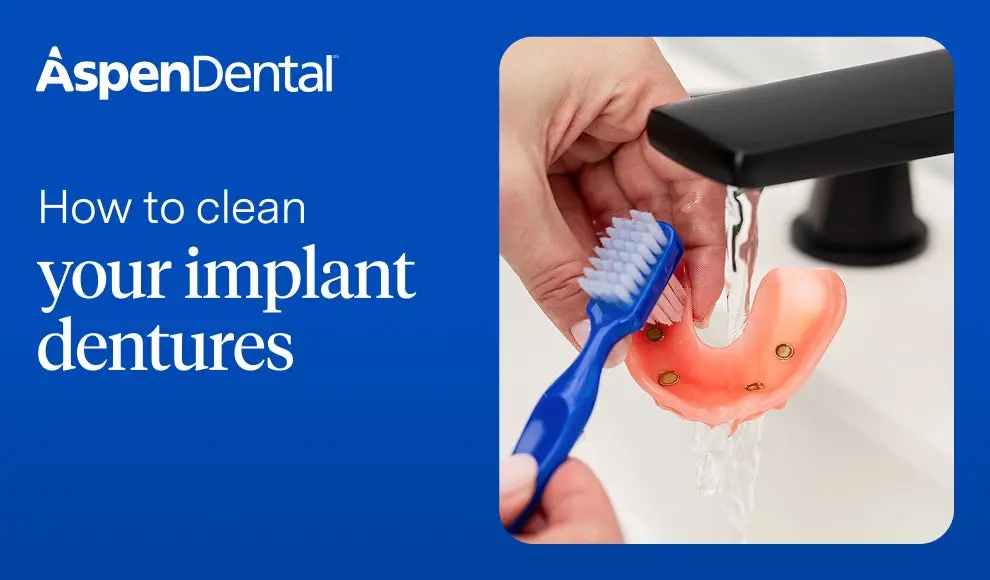
Also known as overdentures or snap-in dentures, implant dentures combine permanent titanium implants with a removable denture. Follow along as we outline the 4 steps you can take to make cleaning your implant denture easy.
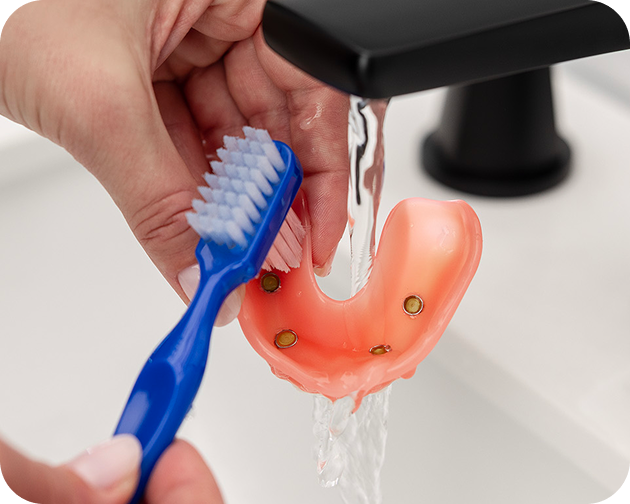
1. Brush
To get started, snap out your denture and run it under lukewarm water. Use a denture brush to gently scrub your denture to remove any debris. After, lightly brush your natural gums with a soft-bristle toothbrush, being as thorough as you can without applying too much pressure.
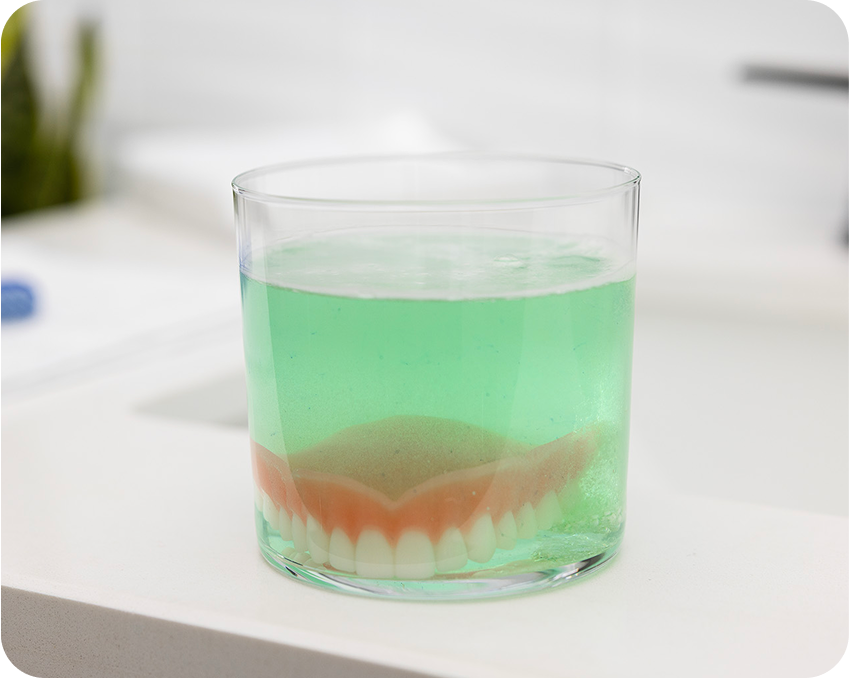
2. Soak
When you’re done brushing your denture and gums, soak it in a cleaning agent designed for overnight care. This will help prevent stains, bacterial growth and odors, and remove deposits.
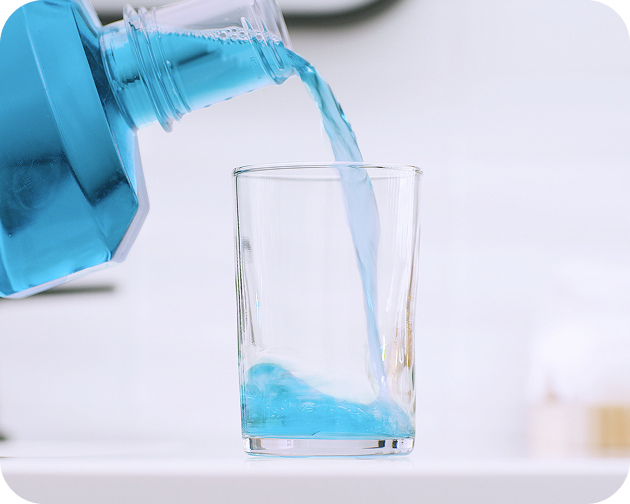
3. Rinse
To minimize bacteria, prevent gum disease or treat gum disease, use an alcohol-free, antiseptic rinse for your freshest smile. After brushing, swish the recommended amount on the bottle of your mouthwash for at least 30 seconds.
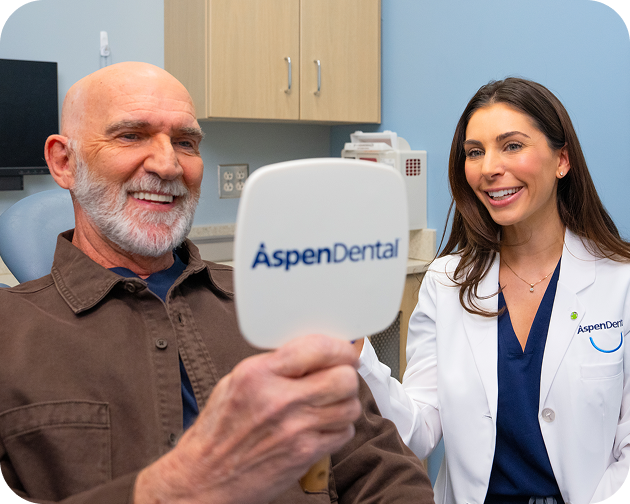
4. Visit
Even with steps 1-3, regular check-ups every 6 months are a must. During each check-up, we’ll take a look at the condition of your implants, assess your denture and monitor your overall oral health.
“When you’re short on time,
a 3-minute denture cleanser can help.”
Aspen Dental Expert Clinician
How to clean your fixed full arch implant
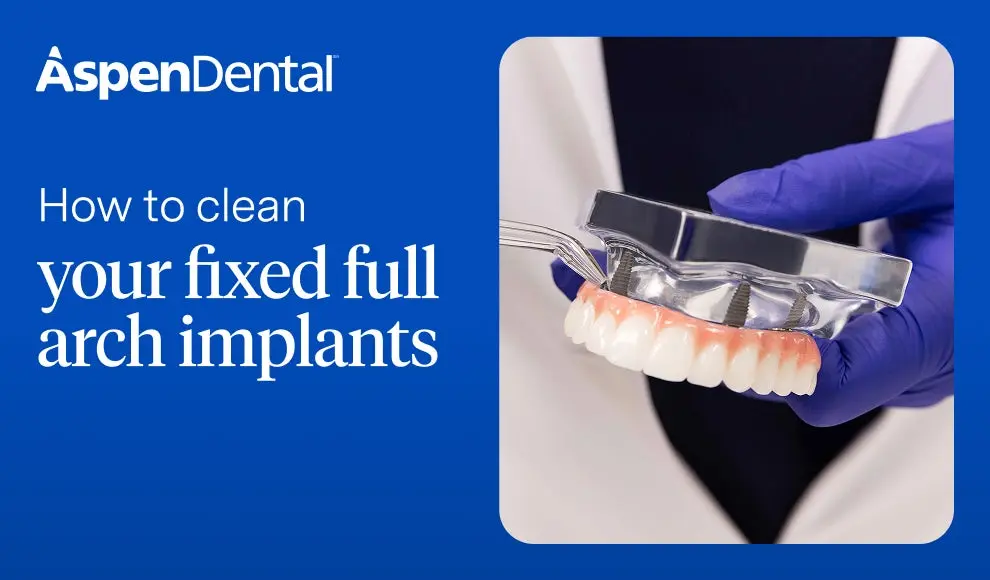
Also known as full mouth implants, fixed full arch implants permanently replace an entire row of teeth with a non-removable prosthetic. While they look as natural as your original smile, caring for them will feel a little different. Here’s what you need to know:
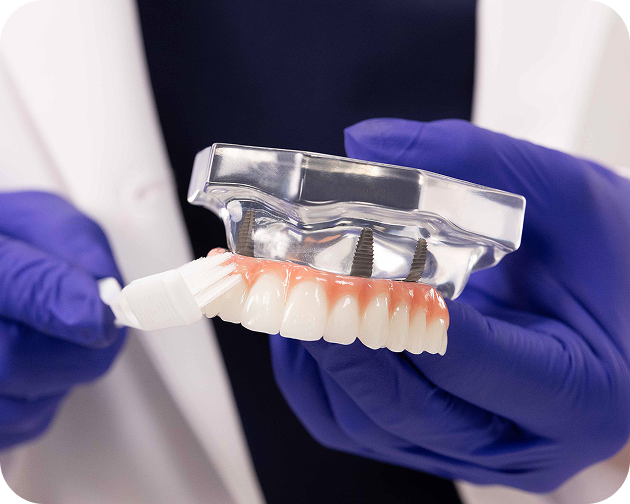
1. Brush
Just like your natural teeth, with full mouth implants you’ll need to brush your teeth twice daily. Use a soft-bristle toothbrush and a non-abrasive gel toothpaste to avoid scratching your prosthetic teeth while helping clear your smile of debris and buildup.
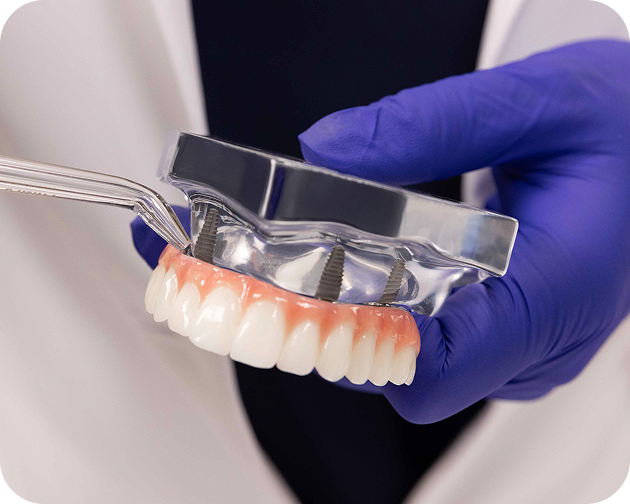
2. Floss
Flossing daily is essential with fixed full arch implants. A power flosser is a great tool to clean thoroughly between your natural teeth, gums, and prosthesis. Take your time to remove debris and help prevent gum inflammation.

3. Rinse
To minimize bacteria, prevent gum disease or treat gum disease, use an alcohol-free, antiseptic rinse for your freshest smile. After brushing, swish the recommended amount on the bottle of your mouthwash for at least 30 seconds.

4. Visit
Even with steps 1-3, regular check-ups every 6 months are a must. During each check-up, we’ll take a look at the condition of your implants, assess your denture and monitor your overall oral health.
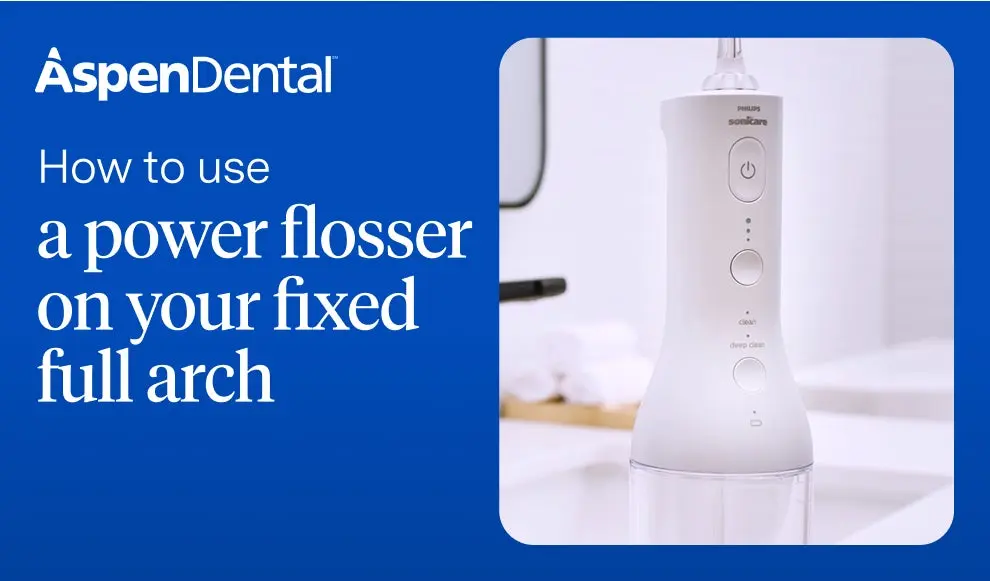
Power up your cleaning routine
A power flosser is an essential tool for maintaining your oral health if you have fixed full arch implants. New to power flossing? Let’s break down all you need to know—from choosing the right tip to mastering your technique.
“No power flosser? Try an angled proxy brush to clean
between your prosthesis and natural gums.”
Aspen Dental Expert Clinician
How to clean your single tooth implant or bridge
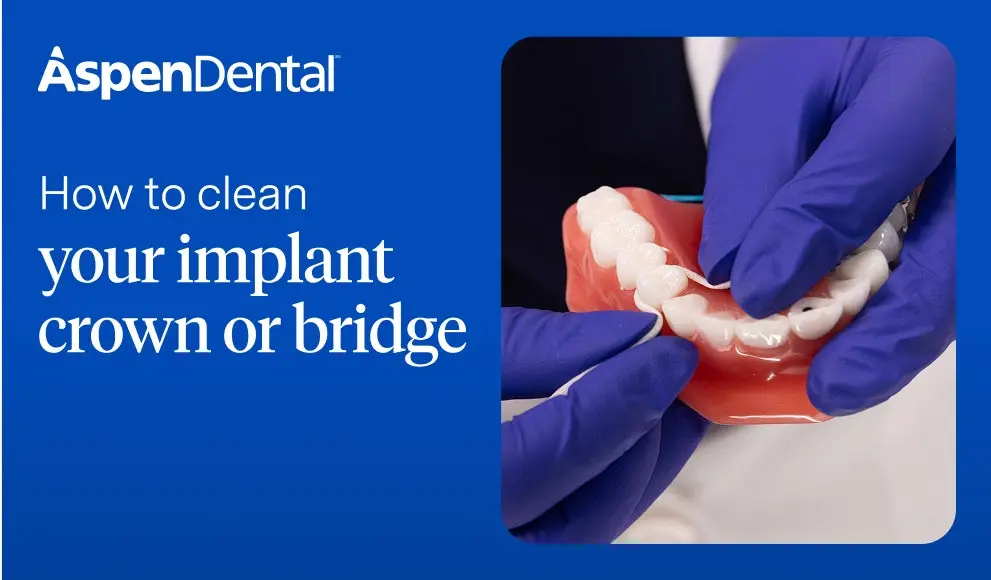
Also known as a dental implant crown, cleaning a single tooth implant or bridge is the most like cleaning your natural teeth. In 4 steps, we’ll help you learn how to clean them to prevent plaque buildup and minimize bacteria for an implant care routine that’ll keep your smile at its best.
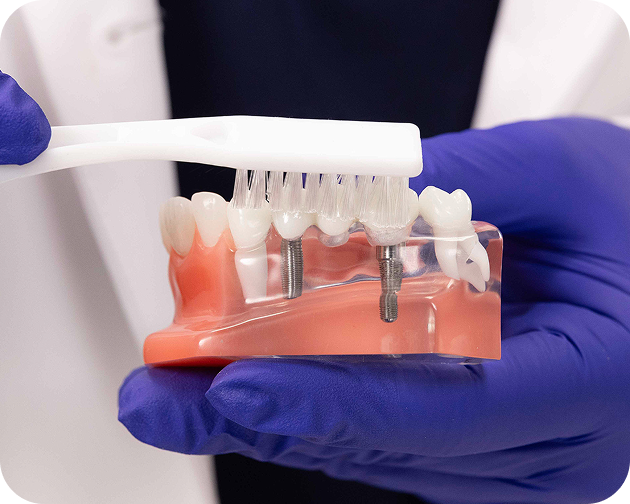
1. Brush
Like your natural teeth, your implant crown needs to be brushed twice a day. We recommend using a soft-bristled toothbrush and non-abrasive fluoride toothpaste for your best results. To clean, gently brush all sides of your tooth and along your gum line.
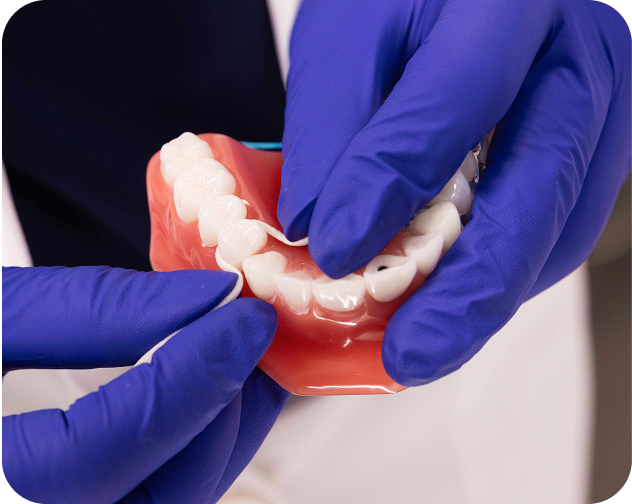
2. Floss
Flossing daily is a must with implants. Use shred-resistant floss to clean between your natural teeth, gums and implant crown. Be thorough to clear debris and help prevent gum inflammation.

3. Rinse
To minimize bacteria, prevent gum disease or treat gum disease, use an alcohol-free, antiseptic rinse for your freshest smile. After brushing, swish the recommended amount on the bottle of your mouthwash for at least 30 seconds.

4. Visit
Even with steps 1-3, regular check-ups every 6 months are a must. During each check-up, we’ll take a look at the condition of your implants, assess your denture and monitor your overall oral health.
“For your best results, clean in between and
under your implant with a proxy brush.”
Aspen Dental Expert Clinician
Why Aspen Dental for implant care
Comprehensive care
We offer a full suite of dental services for all of your smile needs.
Same-day appointments
With same-day availability and flexible hours, getting a cleaning or check-up is easy.
Made affordable for you
Our care is tailored to you and your budget so you can prioritize your smile.
What products do I need to clean my implant denture?
Denture cleanser
For storing your denture overnight and cleaning your denture after a meal, we recommend using Haleon’s Polident product line for your best results. While they have many options to choose from, we recommend:
Polident Overnight Daily Cleanser: Soak your denture overnight for a fresh smile in the morning. Simply add 1 tablet to enough warm water to cover your denture and let it get to work killing 99% of bacteria. Before snapping it back onto your implants, make sure to thoroughly rinse it of any remaining cleansing solution.
Polident 3-Minute Cleanser: If you’re tight on time, pop your denture into this ultra fast cleanser. Like the overnight solution, add 1 tablet to enough warm water to cover your denture, and then rinse it after 3 minutes to snap back onto your implants.
Mouthwash
When looking for a mouthwash that’s implant-friendly, choose an antiseptic or antimicrobial mouthwash to reduce plaque buildup and give you fresh breath. Avoid any options that include alcohol as this can damage your implant crown and your mouth’s microbiome.
Non-abrasive products
When choosing oral care products, avoid options like stiff-bristle toothbrushes, abrasive toothpastes designed for whitening or products that include ingredients like silica or calcium carbonate. Using products like these can damage your denture and the health of your gums.
How to clean implant dentures at home?
Remove your denture and rinse it under warm water. Avoid using hot water as it can weaken and warm your dentures, making it at risk for damage or breakage over time.
Use only a soft-bristled toothbrush and water to gently clean your denture of debris.
Soak your denture overnight in a non-abrasive storing solution. This will help preserve your denture while preventing stains and bacterial growth.
Rinse with an antiseptic mouthwash to reduce any bacteria from the day.
Use a soft-bristled toothbrush to gently clean your mouth, including your gums, around your implants, on your tongue and across the roof of your mouth. This will keep your entire smile feeling fresh and ensure your mouth is thoroughly cleaned of bacteria.
Schedule a professional cleaning at your local Aspen Dental every 6 months to maintain your overall oral health.
How often should I clean the implants under my dentures?
Cleaning your dental implants should be a part of your daily routine. While flossing isn’t required, here are a few steps you can add to your daily care to keep the area where your gums and implants meet healthy.
Using a soft-bristled toothbrush, clean around your implant abutments (the pieces that connect to your denture) at least twice a day.
After brushing, rinse your mouth with an antiseptic mouthwash after meals to prevent plaque or bacteria building up.
Schedule professional cleanings at your local Aspen Dental every 6 months to maintain your overall oral health.
Is there anything I shouldn’t eat with an implant denture?
With implant dentures, you’ll be able to enjoy many of your favorite foods again. However, it’s important to consider options that may make cleaning or caring for your smile difficult. We recommend skipping the following foods to help maintain your healthiest smile and avoid damaging your implant prosthesis:
Sticky foods
Hard foods
Overly chewy or gummy foods
What should I do if my implant dentures feel loose or irritated?
Remove and inspect implant dentures for any debris or damage
Clean thoroughly and try reinserting
Check the colored attachments on your denture (where your denture snaps onto your implants) to check for any changes that could be affecting how your smile fits.
If discomfort continues, schedule a visit with your local Aspen Dental office to check the fit and function of your implant dentures.
What products do I need to clean my dental implants?
Always clean your fixed full arch implants, or full mouth implants, twice a day with:
A soft-bristled toothbrush
Non-abrasive gel toothpaste or Sensodyne Pronamel Clinical Enamel Strength toothpaste
A power flosser to clean your prosthesis. Focus on your implants, gums and where they connect to your prosthesis to remove any food or bacteria
An antiseptic mouthwash to rinse your mouth for at least 30 seconds
For a professional cleaning, schedule a visit at your local Aspen Dental every 6 months to maintain your overall oral health
How to clean fixed full arch implants at home?
Clean your fixed full arch implants, or full mouth implants, twice a day
Use a soft-bristled toothbrush and non-abrasive gel toothpaste to gently care for your prosthesis
Apply gentle pressure to your gums in a circular motion to clean implants thoroughly
Use a power flosser to clean your implants. Focusing on your implants, gums and where they connect to your prosthesis, slowly move along your arch to remove any food or bacteria.
Rinse with an antiseptic mouthwash for at least 30 seconds
Schedule a professional cleaning at your local Aspen Dental every 6 months to maintain your overall oral health
What’s the best way to clean under a fixed full arch implant teeth?
We recommend using a power flosser to clean under your fixed full arch dental implants
If you don’t have a power flosser, use shred-resistant floss for your next best option
Maintain great oral health by flossing twice a day along with our other care tips
Power flossing
Fill your power flosser up with warm water and select the right tip
Angle the water flosser at your gum line and prosthesis
Follow along your gum line, underneath your prosthesis. Focus around where each your implants connect to your prosthesis.
Once complete, rinse with an antiseptic mouthwash
Shred-resistant flossing
Avoid standard floss, as it can shred
Pull your floss underneath your prosthetic. Gently thread it from side to side, focusing around your implants and against your prosthesis to remove debris
Can I use a regular toothbrush on fixed full arch implants?
No, you should always use a soft-bristled toothbrush, soft-bristled manual or electric toothbrushes are safe to use
Brush your fixed full arch implants twice daily with a soft-bristled toothbrush. Apply gentle pressure in a circular motion to clean thoroughly and prevent irritation.
Focus on your gum line while cleaning
Pro tip: When choosing a toothpaste, try Sensodyne Pronamel Clinical Enamel Strength toothpaste or a non-abrasive gel toothpaste for a deep clean and to protect the surfaces of your teeth. For more personalized recommendations, reach out to your Aspen Dental clinician.
How often should I get my fixed full arch implants professionally cleaned?
We recommend visiting your local care team every 6 months to maintain your oral health
Prevent gum inflammation and bone loss with consistent check-ups
Do I still need to floss if I have a full arch implant?
Yes—flossing under the arch helps prevent gum disease, minimize bacteria and prevent plaque build-up
We recommend shred-resistant floss and power flossers
Keep your smile at its best by flossing twice daily, especially before bed
At your next visit, your Aspen Dental care team can walk you through how to floss for your best results
Is there anything I shouldn’t eat with full mouth implants?
With dental implants, many of your favorite foods will be back on the menu. However, it’s important to consider options that may make cleaning or caring for your implants difficulty. Consult your doctor to discuss any foods that you may need to avoid.
What products do I need to clean my dental implants?
Toothpaste
Like your natural teeth, we recommend choosing a non-abrasive, fluoride toothpaste to maintain your overall oral health and avoid scratching or damaging your implant crown. Try Sensodyne Pronamel Clinical Enamel Strength toothpaste to deeply clean and protect the surfaces of your teeth—or ask your Aspen Dental clinician for another recommendation.
Power flosser or shred-resistant floss
How you floss your implant is key to protecting the area around it. Our expert clinicians recommend using a floss product designed for dental implants specifically, such as shred-resistant floss or a power flosser, also known as a water flosser.
Philips Sonicare Cordless Power Flosser: This is our top recommended power flosser to effectively clean along your gum line, in between your teeth and around your dental implant.
Shred-resistant floss: Any option that’s designed with stiff ends and a flexible center to reach between and around the implant will work for this type of floss. Curve the floss around the crown in a C-shape, then gently slide it up and down the side, just like you would to a natural tooth.
Mouthwash
When looking for a mouthwash that’s implant-friendly, choose an antiseptic or antimicrobial mouthwash to reduce plaque buildup and give you fresh breath. Avoid any options that include alcohol as this can damage your implant crown and your mouth’s microbiome.
Non-abrasive products
When choosing oral care products, avoid options like stiff-bristle toothbrushes, abrasive toothpastes designed for whitening or products that include ingredients like silica or calcium carbonate. Using products like these can damage your implant crown and the health of your gums.
How do you clean single dental implants at home?
Brush your implant and natural teeth twice daily with a soft-bristle toothbrush and non-abrasive toothpaste
Floss around the crown of your implant with a power flosser, such as a Philips Sonicare, or shred-resistant floss.
Focus on flossing your gum line toward your implant abutment (the piece connected to your implant crown) to clean hard-to-reach spots.
Rinse with an antiseptic mouthwash to reduce plaque buildup
Use a plaque-removing tool, such as a proxy brush, to gently removal of any plaque or calculus buildup from implant surfaces.
Schedule a professional cleaning at your local Aspen Dental every 6 months to maintain your overall oral health.
How often should I get dental implants professionally cleaned?
We recommend visiting your local care team every 6 months to maintain your oral health
With consistent visits, we can help you protect your implants long-term, and prevent gum inflammation and bone loss.
Do dental implants need special care compared to natural teeth?
Yes, because plaque can build up around the implant and gum line, thorough and consistent daily care is essential to making sure your implants last.
While your implants don't decay like natural teeth, a good oral care routine will help you maintain your implants long-term and prevent staining.
We recommend:
Shred-resistant floss or power flossers to thoroughly clean your gum line
An antiseptic mouthwash to rinse your mouth for at least 30 seconds
A non-abrasive, fluoride toothpaste, such as Sensodyne Pronamel Clinical Enamel Strength toothpaste
Regular cleanings every 6 months are highly recommended. At Aspen Dental, we’ll track your overall oral health and help care for your dental implants so your smile stays healthy long-term.
Is there anything I shouldn’t eat with dental implants?
With dental implants, many of your favorite foods will be back on the menu. However, it’s important to consider options that may make cleaning or caring for your implants difficulty. Consult your doctor to discuss any foods that you may need to avoid.
